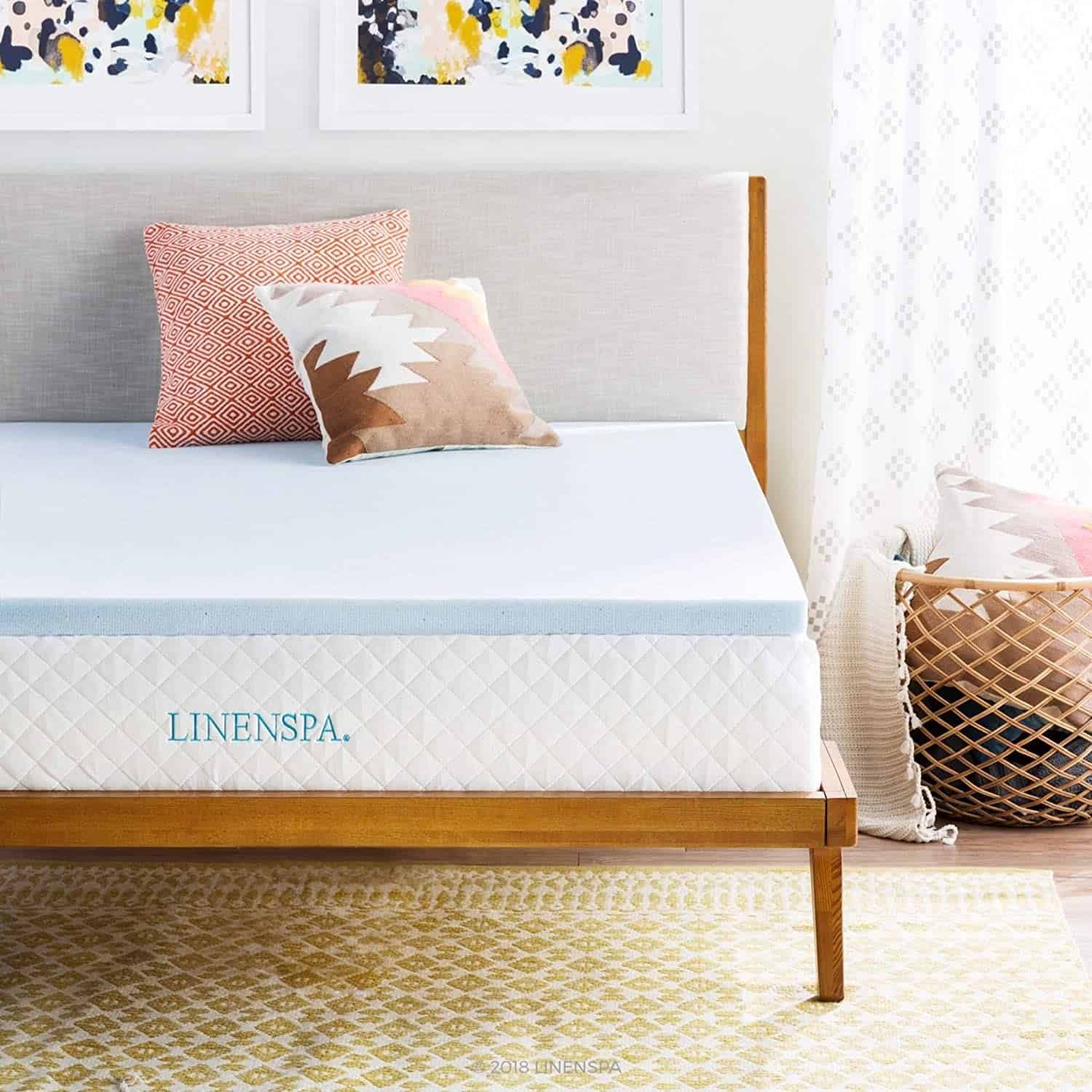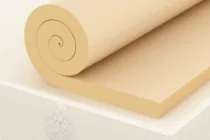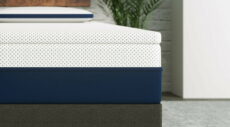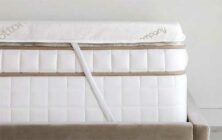You spend one-third of your life sleeping so your mattress should give you optimum comfort and a good night’s sleep. One element of a well-made bed is commonly unnoticed. That is the mattress topper. Mattress toppers can help you sleep more restfully, be cooling, and provide better ventilation. A carefully selected mattress topper can even prolong mattress life and delay the need to replace it. So, you must be wondering, should you decide to purchase a mattress topper or should you replace your existing mattress?
You should buy a mattress topper instead of a new mattress when you need to improve the firmness or softness of your mattress but the mattress is still structurally sound. If the basic support structure of a mattress is going or gone, then a mattress topper won’t be enough, and you should consider replacing the mattress.
3 great toppers we recommend (if you cannot afford to buy a new mattress)
Related articles:
- When should you use the mattress topper hack and when shouldn’t you use it?
What Are Mattress Toppers and What Are Their Benefits?
As the name implies, a mattress topper is an extra layer that is laid over your conventional mattress, adding height, firmness, and cushioning. It can be made of a variety of materials, including latex, memory foam, and feathers, in a varied selection of thicknesses and densities. Mattress toppers also differ from mattress protectors. Be sure to check out our article, do you need a mattress protector for more detailed information. Mattresses are quite expensive and they’re difficult to clean, so the mattress topper offers an additional layer of protection for that important investment.
Now, look at the surface of your mattress. Is it distorted and full of peaks and valleys? A mattress topper can help level some of that out. Mattresses themselves are often made of synthetic fabric – a rough aggregate that’s a heavy-duty material – but it’s coarse and you’re going to feel that. Mattress toppers can make that mattress more comfortable.
- You may also find our complete guide to mattress topper benefits and disadvantages for more information.
- Do you need a mattress topper? Take a look at our article to find out!
- Make sure to take a look at our article on how to fix a mattress topper from sliding off as well.
Mattress Toppers Vs. Mattresses: A Comparison
Mattresses and mattress toppers are made by the same industry. In fact, manufacturers, such as Foamite which makes foam products, often produce both when they use the same materials and equipment. They have many similar features, but mattresses differ from toppers in their main purpose, material, thickness, density, and durability.
Purpose of A Mattress Compared to a Mattress Topper
Mattresses are the primary sleeping solution. As such, a high-quality mattress is designed for a lifecycle of 10-15 years, whereas a mattress topper will last less than 5 years.
A good mattress topper provides you with an additional layer to your mattress to enhance firmness/softness and improve heat regulation, provided that your mattress is still in a good condition. You may find our article on how to choose a mattress topper to reduce shoulder pain helpful as well.
The Different Materials of Mattresses and Mattress Toppers
Designed for a long life cycle, mattress manufacturers choose from a wide variety of durable materials. Mattresses can be made with innerspring, foam, memory foam, polyfoam, hybrid materials, synthetic fibers, natural/organic materials (like natural latex: Dunlop and Talaaly), wool, cotton, or any combination. Even water and air can be used to fill a mattress.
In contrast, as a product meant to be used for a shorter life cycle, most common mattress toppers are made of latex, memory foam, polyester blends, feathers, or wool.
Related articles:
-
Be sure to take a look at choosing the right mattress topper for a side sleeper too.
- Our guide to: Latex vs. memory foam mattress toppers
Thickness of Mattress Toppers and Mattresses
Owing to their purpose, mattresses are generally made of several layers and are thicker than toppers. Mattresses need to fully support body weight, and are intended to have a longer life.The thickness of most high-quality mattresses varies from 8 to 14 inches. However, you may find thinner (2-8 inches) or thicker (16+ inches) mattresses.
Mattress toppers, however, generally, have a thickness that falls in the range of 2-4 inches, rarely reaching 5 inches. Take a look at our article on how to choose the right mattress topper for hip pain as well.
Comparing the Density of Mattresses and Mattress Toppers
Probably, the usual area of similarity between mattresses and toppers are their densities. For both mattresses and mattress toppers, low density starts at 3 lbs/ft3 or less, medium-density measures 4-5 lbs/ft3, and high density will be 6 lbs/ft3 or more. Our article on choosing the right mattress topper for hip pain and support may also be of interest to you.
Durability of a Mattress Compared to a Mattress Topper
Mattresses are generally intended for a lifespan of longer than 10 years. High-quality mattresses will last up to 15 or even 25 years. They are designed for daily repetitive use and to support our body weight for hours, normally eight hours a day.
Mattress toppers, on the other hand, are simply an extra layer designed to adjust the firmness or softness of your mattress and improve sleep quality. As an add-on, they are designed for a shorter life cycle of no more than five years.
Some mattress toppers like copper mattress pads and toppers can be more durable than others.
Summary of Differences Between Mattress Toppers vs. Mattresses
| Feature of Mattress Toppers and Mattresses | Mattress Toppers | Mattresses |
| Primary purpose | Adds extra softness or firmnessExtends a mattress’s lifespan | Primary sleeping surface |
| Thickness | 2 inches (thin) 3 inches (medium) 4 inches (thick) | 2-5 inches (low profile) 5-8 inches (slim) 8-12 inches (standard) 12-16 inches (thick) 16+ inches (extra thick) |
| Density | 3 lbs/ft3 (low density) 4-5 lbs/ft3 (medium density) 6+ lbs/ft3 (high density) | 3 lbs/ft3 (low density) 4-5 lbs/ft3 (medium density) 6+ lbs/ft3 (high density) |
| Price | $25-100 | $105-700 |
| Materials | Latex Memory foam Polyester blends Feathers Wool | Polyurethane foam Memory foam Latex Feathers Wool Cotton Polyester batting |
| Durability / Life span | Avg. 3-5 years (high quality) | Avg. 10-15 years (high quality) |
Make sure to take a look at our article on how to choose a mattress topper for camping for additional suggestions.
When Should You Buy a Mattress Topper instead of a New Mattress?
Over the course of years, your mattress can flatten out and become lumpy or bulging. When that happens, you may find yourself wishing that you had a softer or more comfortable mattress.
You should buy a mattress topper instead of a new mattress when you want to keep your mattress clean and extend its life. Buy a mattress topper to make an otherwise structurally sound mattress more comfortable, softer, firmer, or cooler.
The good news is you don’t always have to buy a new mattress when your mattress starts to show some signs of wear. You could just invest a smaller amount of money in a mattress topper. So, no matter what your needs are, you’re still going to be able to find a topper to soften up your mattress to make it more comfortable so you don’t have to go out and buy a new mattress.
Mattress toppers are available in a wide variety of comfort, preferences, and styles, ranging from memory foam, popular for its ability to contour to the shape of your body and slowly rebound, all the way up to latex which is the most expensive. Some mattress toppers are naturally anti-microbial and anti-dust mites, so there are some added benefits there.
A word of caution: although a mattress topper can improve your sleeping, it cannot be the ultimate solution for an old mattress (over 7 years) with a shabby/sagging structure. Actually, it will cost you more money in the long run, as you will eventually be compelled to buy a new mattress anyway. If you want more details on how to install a mattress topper, take a look at our article.
You should buy a mattress topper instead of a new mattress when your mattress is firmer than desired, and you’re looking for more softness without having to replace the whole mattress. If your mattress feels softer than you want it to be, and you need to sleep on a firmer surface, adding a firmer mattress topper can help. If you would just like to upgrade your sleeping experience to make it more cozy and luxurious without paying a hefty price for a luxury mattress, there are many toppers available that can do just that. Buy a mattress topper when you wish to extend your mattress lifespan, while it is still in good condition or you want to keep your mattress clean.
Situations When to Buy a Mattress Topper or a Mattress and Some Product Suggestions
| Situation | Should You Buy a Mattress or a Mattress Topper in This Situation? | Suggested Product from Amazon | Price |
| Your mattress is too soft. | Buy a firm mattress topper as it will be cheaper and still make your mattress firmer. | Natural latex topper from Sleep On | ~$20 |
| Your mattress is too firm | Buy a foam mattress topper that will soften up the bed. | Foam topper by Sealy | ~$60 |
| Your mattress feels too hot. | Buy a well-ventilated mattress topper. | Feather topper from Blue Ridge Home Fashions | ~$90 |
| Your mattress is sagging | If you think your mattress has a few more years left, then a mattress topper should be ok to purchase. Get a thick, firm topper, so it doesn’t sag. | 4” SleepInnovations Topper | ~$110 |
| Your mattress has holes or cracks | It’s time for a new mattress |
Can a Mattress Topper Replace a Mattress?
Normally, a mattress topper is a short-term solution for an aging mattress that can cost hundreds to replace. It can extend the lifespan of a slightly old mattress and make it more resilient or softer. While a mattress topper can be an extra layer of comfort, it needs to lay on a stable basic layer, the mattress. It cannot act as a replacement for your old mattress.
A mattress topper cannot replace your mattress, because it is not designed for long-term and repetitive use. It is a thin, lightweight, and short-lived layer of sleep enhancing material.
Can a Mattress Topper Help You Sleep on the Floor?
While sleeping on the floor isn’t generally recommended, in many situations (for example, in the middle of moving to a new house), we might be obliged to sleep on the floor. In this case, use a mattress topper. It’s cheap and definitely better than sleeping on a sheet or bare floor.
A mattress topper can help you sleep on the floor temporarily. It isn’t designed for long-term and repetitive use as your primary bedding since mattress toppers are thin and don’t have the structural components of mattresses.
Advantages of Sleeping on a Mattress Topper on the Floor
1. In many places around the world, it is cheaper.
2. Healthwise, the vertebral column maintains more of its natural orientation on the floor than on a box spring mattress.
3. You will enjoy a cooler sleep (if you’re a hot sleeper).
Disadvantages of Sleeping on a Mattress Topper on the Floor
1. You are exposed to insects on the floor.
2. On a dump floor, your topper may absorb some moisture. If it does, it will provide a nurturing environment for mold and bacteria.
3. If you are a side sleeper, the sleep experience will be uncomfortable.
When to Get a Mattress Topper Instead of a New Mattress
If your mattress is old (over 7 years) and has dents, you should buy a new mattress. However, if you want to adjust the firmness or temperature of your mattress and it is in a good condition, you should get a mattress topper instead of a new mattress.
The benefits of a mattress topper over a mattress are the lower price and higher movability. The advantages of a mattress over a topper are their longer durability and the ability to support, on its own, a full adult person. By contrast, a topper needs a mattress underneath to support body weight.
Further Readings:




